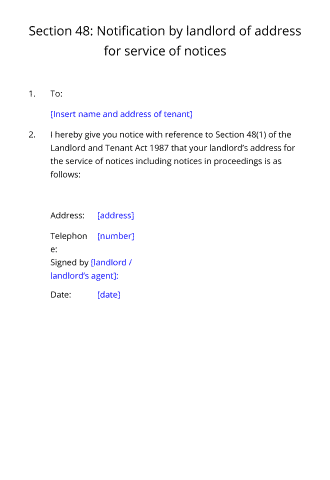Section 48 notice

Document overview

 England & Wales
England & Wales

- Length:1 pages (260 words)
- Available in:
 Microsoft Word DOCX
Microsoft Word DOCX Apple Pages
Apple Pages RTF
RTF

If the document isn’t right for your circumstances for any reason, just tell us and we’ll refund you in full immediately.

We avoid legal terminology unless necessary. Plain English makes our documents easy to understand, easy to edit and more likely to be accepted.

You don’t need legal knowledge to use our documents. We explain what to edit and how in the guidance notes included at the end of the document.

Email us with questions about editing your document. Use our Lawyer Assist service if you’d like our legal team to check your document will do as you intend.

Our documents comply with the latest relevant law. Our lawyers regularly review how new law affects each document in our library.
About this document
This notice allows you to comply with section 48 of the Landlord and Tenant Act 1987 (the 'Act').
One of the principles under landlord and tenant law is that the tenant must always be able to serve notices on their landlord, whether to end a tenancy or to request repairs or for another reason.
If the landlord changes address (or appoints new agents), they must tell the tenant or tenants the new address at which they can be contacted (and importantly at which notices can be served).
Sending this form (completed) to the tenants notifies them of the change of service address.
What is Section 48?
Section 48 of the Landlord and Tenant Act 1987 states that landlords of residential tenancies in England and Wales must provide their tenants with an address, which must be in England & Wales, to which the tenants can send notices and be sure that they will be received.
Usually, the landlord's address is provided in the tenancy agreement when identifying each party to the lease. But it can change over time.
Failure to provide a valid address has the consequence that any claim by the landlord for rent, rent arrears, service charges or administration charges is not enforceable by court action. Amounts that otherwise would have been due instead are treated only as becoming due only when the landlord complies with the law and gives correct notice, despite any previous demand served.
The effect of s48 is that the landlord is prevented from enforcing recovery of any rent or service charges until the correct notice is given.
Properties managed by agents
The requirement to provide the landlord’s address to tenants can be a potentially difficult issue for property managing agents and letting agents dealing on the landlord's behalf with ground rent demands or a service charge.
Case law established in the Upper Tribunal in 2012 as a result of the case between Beitov Properties Ltd v Elliston Martin [2012] UKUT 133 (LC) clarifies which address agents should provide.
On demands for rent or other sums due under the terms of the tenancy or long lease (under section 47 of the Act), the tenant must be provided with the name and address of the landlord, whether that is a home address, registered office or a usual place of business. It cannot be the address of the managing agent or the letting agent. It must also be an address in England or Wales. The Tribunal Judge in the case clarified that the purpose of providing this address was to identify the landlord, not to give an address at which notices can be served.
However, the purpose of a section 48 notice is to provide an address at which notices may be served by the tenant. It is not to identify the landlord.
The address must still be one in England and Wales, but can be one of the managing or letting agent. It does not need to be where the landlord is resident, the registered office of their limited company or a place where they carry on a business.
Contents
- Name and address of tenant
- Address of landlord or agent for service of notice
- Other legal provisions
- Validity of notice
- Explanatory notes

Recent reviews
Choose the level of support you need
Document Only
This document
Detailed guidance notes explaining how to edit each paragraph
Lawyer Assist
This document
Detailed guidance notes explaining how to edit each paragraph
Unlimited email support - ask our legal team any question related to completing the document
- Review of your edited document by our legal team including:
- reporting on whether your changes comply with the law
- answering your questions about how to word a new clause or achieve an outcome
- checking that your use of defined terms is correct and consistent
- correcting spelling mistakes
- reformatting the document ready to sign
All rights reserved
